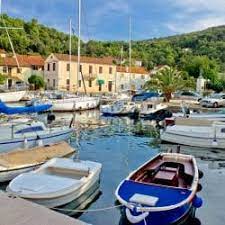
Mali was once part of flourishing Empires, before being colonized by France and finally becoming independent. This fascinating West African country is hiding an inestimable ancient knowledge and countless cultural wonders. Strange mosques made of earth looking like sandcastles and villages directly carved into pink cliffs give Mali’s dusty landscapes a surrealist atmosphere. Malian people have an incredible sense of celebration and live to the rhythm of their traditional music. Bamako, the capital city lying on the beautiful Niger river, is the beating heart of the country. Unfortunately, an endless large scale drought coupled with recent deadly conflicts are threatening the inestimable treasures hidden in Mali.
HEALTH INFORMATION
We make every effort to ensure that the information posted on our website is up to date and accurate according to the latest public health recommendations; however, it is impossible for us to make changes on a daily basis.
For the most current travel health recommendations, please call our clinic as make an appointment with one of our travel health professionals.
MALI – RECOMMENDED VACCINES
| Hepatitis A | Recommended for all travelers. |
| Hepatitis B | Recommended for all travelers. |
| Causes, Symptoms & Treatment – Typhoid fever | Recommended for all travelers. |
| Tetanus – Diphteria – Pertussis Vaccine | Tetanus: In exceptional circumstances (eg, stay in a region where access to health care is limited), for a person aged 18 years or older, 1 dose of DT may be given if 5 years or more has elapsed since the last dose. Otherwise, one booster dose at the age of 50*. Pertussis (Whooping Cough): 1 dose is recommended for pregnant women, for every pregnancy, regardless of immunization history and the interval since the last dose (betwen week 26 and 32). *Only applicable for Quebec. |
| Polio | One-time booster recommended for any adult traveler who completed the childhood series but never had polio vaccine as an adult (after 18 years old only). |
| Measles – Rubella – Mumps | Two doses recommended for all travelers born after 1970, if not previously given. |
| Cholera | For humanitarian workers and health care providers. |
| Meningitis | Recommended for all travelers during the season from November to June (dry season). Consider immunization for specific groups outside the dry season |
| Flu – Influenza | Seasonal influenza occurs worldwide. The flu season usually runs from November to April in the northern hemisphere, between April and October in the southern hemisphere and year round in the tropics. Influenza (flu) is caused by a virus spread from person to person through coughing and sneezing or by touching infected surfaces. Everyone 6 months and older should get a flu vaccine yearly. Vaccine is recommended 14 days prior to departure. |
| Routine vaccines (dCaT, Polio, Meningococcal, Shingles, Pneumococcal, Hepatitis B, HPV, MMR & Varicella) | Recommended for all travelers |
| African Tick Bite Fever | Presence. All travellers should protect themselves against tick bites. |
| Transmission, Symptoms and Prevention – Rabies | For travelers at high risk of animal bites or being involved in activities with bats, dogs and other mammals. Clients who plan to visit remote areas may consider receiving this vaccine. Important to note the pre-exposure rabies vaccine is administered in 2 doses with one week interval between doses. Post-exposure vaccination is always recommended, even for those previously vaccinated. |
| Schistosomiasis | Avoid swimming in fresh water. |
| The Yellow Fever Vaccine | A proof of vaccination against yellow fever may be required upon entry in to this country. Some travellers may not be eligible to receive this vaccine. Please enquire with your health care professional regarding your specific details. It is important to note that the vaccine should be administered at least 10 days prior to your departure. For further information, please consult with the World Health Organization (WHO) website: https://www.who.int/ith/ith- |
| Turista – Traveler’s Diarrhea (ETEC) | Talk to your health care professional about the risks and precautionary measures to take, as well as the Dukoral® vaccine. Important to note that the Dukoral vaccine is an oral vaccine given in 2 doses, recommended at least 2 weeks prior to departure. |
| Malaria | Malaria is present in this country. The risk may be region specific. Prophylaxis measures to be discussed with the health care professional. |
| Dengue Fever, Chikungunya and/or Zika | There are many illnesses that are transmitted via mosquito bites and unfortunately we do not have vaccines to protect us against most of them. It is important to inquire with your healthcare professional regarding the specific risks and the different illnesses presently in circulation. |
RECOMMENDED MEDICATIONS
| Antimalarials Recommended | Malarone, Doxycycline or Mefloquine |
| Antibiotics Traveler’s Diarrhea | Azithromycin or Suprax |
MEDICAL CARE
Access to health care in Mali can be extremely limited as there are not many medical facilities in the country, especially outside of Bamako, the capital city. If you need medical assistance while traveling in Mali, it is advised that you go to the Point G University Medical Center or to the Gabriel Toure University Hospital Center, both located in Bamako. These establishments provide good basic medical care. In the event of serious health issues, an air evacuation to another country is required.
In case of emergency in the country, call 15.
Basic medicines can be found in Mali, but don’t forget to bring your own medical kit containing all the drugs and treatments you could need.
SECURITY ABROAD
Northern Mali remains a safe haven for terrorist groups. They are carrying out attacks targeting mainly the Malian police and members of the United Nations Multidimensional Integrated Stabilization Mission in Mali (MINUSMA).
CANADIAN EMBASSY
Emergency services
In case of emergency, dial:
- police: 17
- medical assistance: 15
- firefighters: 18
